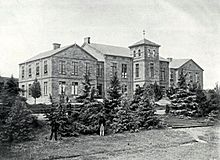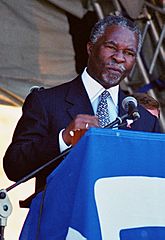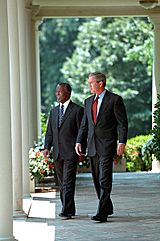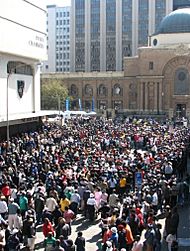Thabo Mbeki facts for kids
Quick facts for kids
Thabo Mbeki
|
|||||||||||||||||||||||||||||||
|---|---|---|---|---|---|---|---|---|---|---|---|---|---|---|---|---|---|---|---|---|---|---|---|---|---|---|---|---|---|---|---|
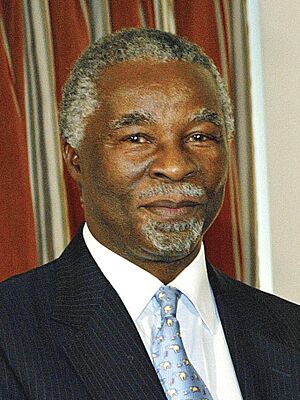
Mbeki in 2003
|
|||||||||||||||||||||||||||||||
| 2nd President of South Africa | |||||||||||||||||||||||||||||||
| In office 14 June 1999 – 24 September 2008 |
|||||||||||||||||||||||||||||||
| Deputy |
|
||||||||||||||||||||||||||||||
| Preceded by | Nelson Mandela | ||||||||||||||||||||||||||||||
| Succeeded by |
|
||||||||||||||||||||||||||||||
| 12th President of the African National Congress | |||||||||||||||||||||||||||||||
| In office 20 December 1997 – 18 December 2007 |
|||||||||||||||||||||||||||||||
| Deputy | Jacob Zuma | ||||||||||||||||||||||||||||||
| Preceded by | Nelson Mandela | ||||||||||||||||||||||||||||||
| Succeeded by | Jacob Zuma | ||||||||||||||||||||||||||||||
| 2nd Deputy President of South Africa | |||||||||||||||||||||||||||||||
| In office 10 May 1994 – 14 June 1999 Serving with Frederik Willem de Klerk
until 30 June 1996 |
|||||||||||||||||||||||||||||||
| President | Nelson Mandela | ||||||||||||||||||||||||||||||
| Preceded by | Alwyn Schlebusch (as Vice State President) | ||||||||||||||||||||||||||||||
| Succeeded by | Jacob Zuma | ||||||||||||||||||||||||||||||
| 6th Deputy President of the African National Congress | |||||||||||||||||||||||||||||||
| In office 20 December 1994 – 20 December 1997 |
|||||||||||||||||||||||||||||||
| President | Nelson Mandela | ||||||||||||||||||||||||||||||
| Preceded by | Walter Sisulu | ||||||||||||||||||||||||||||||
| Succeeded by | Jacob Zuma | ||||||||||||||||||||||||||||||
| Member of the National Assembly | |||||||||||||||||||||||||||||||
| In office 9 May 1994 – 20 December 1997 |
|||||||||||||||||||||||||||||||
| Constituency | Eastern Cape | ||||||||||||||||||||||||||||||
| National Chairperson of the African National Congress | |||||||||||||||||||||||||||||||
| In office 24 April 1993 – 20 December 1994 |
|||||||||||||||||||||||||||||||
| Preceded by | Oliver Tambo | ||||||||||||||||||||||||||||||
| Succeeded by | Jacob Zuma | ||||||||||||||||||||||||||||||
|
|||||||||||||||||||||||||||||||
| Personal details | |||||||||||||||||||||||||||||||
| Born |
Thabo Mvuyelwa Mbeki
18 June 1942 Mbewuleni, South Africa |
||||||||||||||||||||||||||||||
| Political party | African National Congress | ||||||||||||||||||||||||||||||
| Other political affiliations |
South African Communist Party (Tripartite Alliance) | ||||||||||||||||||||||||||||||
| Spouse |
Zanele Dlamini
(m. 1974) |
||||||||||||||||||||||||||||||
| Children | Kwanda Mbeki | ||||||||||||||||||||||||||||||
| Parents |
|
||||||||||||||||||||||||||||||
| Relatives |
|
||||||||||||||||||||||||||||||
| Alma mater | University of Sussex | ||||||||||||||||||||||||||||||
| Occupation |
|
||||||||||||||||||||||||||||||
| Signature | |||||||||||||||||||||||||||||||
Thabo Mvuyelwa Mbeki (born 18 June 1942) is a South African politician. He was the second democratic President of South Africa, serving from 1999 to 2008. He took over from the famous leader Nelson Mandela. Before becoming president, Mbeki was the deputy president.
Mbeki's father, Govan Mbeki, was a well-known leader in the African National Congress (ANC). The ANC was the main group fighting against apartheid, a system of racial segregation in South Africa. Thabo Mbeki joined the ANC's Youth League when he was just a teenager. He spent nearly 30 years living outside of South Africa in exile. During this time, he worked to build support for the ANC around the world.
When apartheid ended, Mbeki returned to South Africa. He helped with the talks that led to the country's first democratic elections in 1994. After the election, he became deputy president. In 1999, he was elected president. As president, he focused on growing South Africa's economy and building stronger relationships with other African countries.
However, his presidency also had major challenges. His government's slow response to the HIV/AIDS health crisis was heavily criticized. He also faced a political rivalry with Jacob Zuma, which led to Mbeki resigning as president in 2008 before his term was over.
Contents
Early Life and Activism
Thabo Mbeki was born on 18 June 1942, in the Eastern Cape of South Africa. His parents, Govan and Epainette, were both teachers and activists against apartheid. Mbeki has said he was "born into the struggle." His home had pictures of leaders like Karl Marx and Mahatma Gandhi.
He started school in 1948, the same year the government began to create the laws of apartheid. As a teenager, he joined the ANC Youth League. He was a student leader and was expelled from his high school, Lovedale, for helping to organize a protest.
After finishing his exams, Mbeki moved to Johannesburg. The ANC had been banned by the government, so he worked with other youth groups in secret. The ANC leaders told him to leave South Africa to continue his work and studies safely. He left for England in 1962 after a difficult journey.
Life in Exile
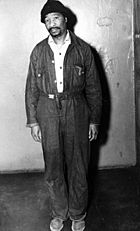
Mbeki spent almost 30 years in exile, living and working in other countries. This was a very important time for him and for the ANC.
Studying and Working in England
Mbeki studied economics at the University of Sussex in England. While he was there, his father was arrested in South Africa during the famous Rivonia Trial. Govan Mbeki was sentenced to life in prison along with Nelson Mandela and other leaders. Thabo Mbeki spoke out against this at the United Nations.
After finishing his master's degree, he worked full-time for the ANC in London. He became a close friend and student of Oliver Tambo, the ANC's president. Tambo became like a father to him while he was in exile. Mbeki was known for being a great writer and speaker. He helped shape the ANC's message to the world.
Working in Africa
In the 1970s, Mbeki moved to Lusaka, Zambia, where the ANC had its headquarters. He worked in the ANC's information department, helping to share news about the fight against apartheid. He also helped set up ANC offices in nearby countries like Botswana and Swaziland.
He later became the ANC's representative in Nigeria. He was good at building relationships with African leaders and getting their support. By the late 1970s, he was one of Oliver Tambo's most trusted advisors.
Leading Negotiations
In the 1980s, Mbeki began to lead secret talks with the South African government. These meetings were held in different places, including a country house in England. Mbeki and his team met with government officials to discuss a peaceful end to apartheid.
These secret talks were a big step. They helped lead to the government unbanning the ANC in 1990 and releasing political prisoners, including Nelson Mandela and Mbeki's own father.
Rise to the Presidency
When the ANC was unbanned in 1990, Mbeki returned to South Africa. He played a key role in the official talks to create a new, democratic country.
Deputy President
After South Africa's first democratic election in 1994, Nelson Mandela became president. He chose Mbeki to be one of his two deputy presidents. It soon became clear that Mandela wanted Mbeki to be the next leader. Mbeki took on many of the day-to-day tasks of running the government.
In 1997, Mbeki was elected president of the ANC, taking over from Mandela. This prepared him to become the country's next president.
Becoming President
In the 1999 elections, the ANC won a big victory. Thabo Mbeki then became the second president of a democratic South Africa. He promised to continue Mandela's work and to bring growth and development to the country.
Presidency of South Africa
As president, Mbeki focused on two main areas: improving South Africa's economy and strengthening its role in Africa.
Economic Policy
Mbeki's government followed an economic plan called GEAR (Growth, Employment and Redistribution). The goal was to grow the economy, reduce government debt, and attract foreign investment. During his presidency, South Africa's economy grew steadily.
However, some people criticized his policies. They said the policies did not do enough to reduce poverty and unemployment. This created disagreements between Mbeki and some groups within the ANC's alliance, like the trade unions.
His government also expanded the Black Economic Empowerment program. This program aimed to give Black South Africans more ownership and control in the economy.
Foreign Policy
Mbeki was very passionate about foreign policy. He had a vision for an "African Renaissance". This was an idea that African countries should work together to solve their own problems and become stronger.
He was a key leader in creating the African Union (AU), which replaced the old Organisation of African Unity. He was the AU's first chairperson. He also helped start the New Partnership for Africa's Development (NEPAD), a plan for economic development across the continent.
Mbeki also worked to build partnerships with other developing countries like Brazil and India. Together, they pushed for a stronger voice for the Global South in world affairs.
HIV/AIDS Controversy
One of the most difficult parts of Mbeki's presidency was his government's handling of the HIV/AIDS crisis. At the time, South Africa had one of the highest rates of HIV infection in the world.
Mbeki questioned the link between HIV and AIDS. He suggested that poverty might be a major cause of the illness. His government was very slow to provide life-saving antiretroviral (ARV) medicines in public hospitals.
Health experts and activists heavily criticized these delays. Studies later showed that hundreds of thousands of lives could have been saved if the government had acted sooner. This remains a very controversial part of his legacy.
Quiet Diplomacy in Zimbabwe
During Mbeki's presidency, neighboring Zimbabwe faced a major political and economic crisis under its leader, Robert Mugabe. Mbeki chose a policy of "quiet diplomacy." This meant he tried to solve the problems through private talks instead of public criticism or sanctions.
Many people at home and around the world criticized this approach. They felt he was not being tough enough on Mugabe's government. However, Mbeki believed it was the best way to help Zimbabweans find a solution without outside interference.
Resignation and Later Life
Mbeki's political career ended after a power struggle within the ANC.
Rivalry with Jacob Zuma
In 2005, Mbeki removed his deputy president, Jacob Zuma, from his post because of accusations of wrongdoing. This started a long and bitter rivalry between the two leaders and their supporters.
At the ANC's national conference in Polokwane in December 2007, Zuma challenged Mbeki for the party presidency. Zuma won the election with strong support from the ANC's youth league and trade union partners. This meant Zuma was now likely to become the next president of South Africa.
Resignation
In September 2008, the ANC's leadership committee asked Mbeki to resign as president of the country. This happened after a court judgment suggested there had been political interference in the case against Zuma.
Mbeki agreed to resign. He said he was a loyal member of the ANC and would follow the party's decision. He was replaced by Kgalema Motlanthe, who served as president until the 2009 election.
Life After Presidency
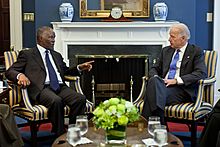
After leaving office, Mbeki has remained active in African politics. He has worked as a mediator to help solve conflicts in countries like Sudan and Zimbabwe.
He also started the Thabo Mbeki Foundation. The foundation works to promote his vision of an "African Renaissance" and to train new leaders for the continent. He sometimes comments on South African politics but has mostly stayed out of the spotlight.
Personal Life
In 1959, Mbeki had a son named Monwabisi Kwanda. Kwanda disappeared in 1981 while in exile and is believed to have died. Mbeki's youngest brother, Jama, also disappeared in exile.
In 1974, Mbeki married Zanele Dlamini Mbeki, a social worker he met in London. They do not have any children together. His only living brother, Moeletsi, is a well-known economist.
Images for kids
-
Mbeki with Russian President Vladimir Putin, Canadian Prime Minister Jean Chrétien and Malaysian Prime Minister Mahathir Mohamad in June 2003.
-
Mbeki with Brazilian President Lula da Silva and Indian Prime Minister Manmohan Singh at the second IBSA summit in Pretoria, October 2007.
-
Mbeki with Russian President Vladimir Putin in Cape Town, September 2006.
-
Mbeki with Russian President Dmitry Medvedev at the 34th G8 summit, July 2008.
-
Mbeki at a United Nations meeting on Sudan, July 2019.
-
Mbeki's brother Moeletsi in Amsterdam in 1978, accepting an award on behalf of their father. The banner calls for Govan's release.
See also
- History of the African National Congress
- Operation Vula
- 2008 South African presidential election
- Frank Chikane
- Joel Netshitenzhe
- Bulelani Ngcuka
 | Aaron Henry |
 | T. R. M. Howard |
 | Jesse Jackson |


